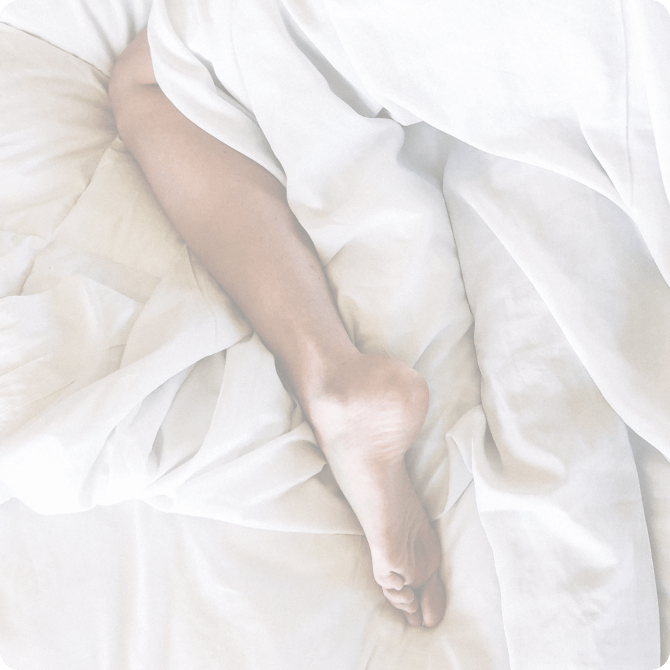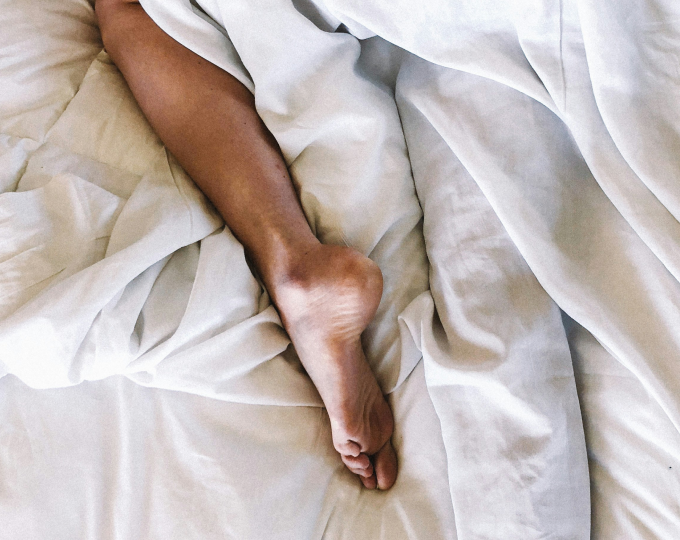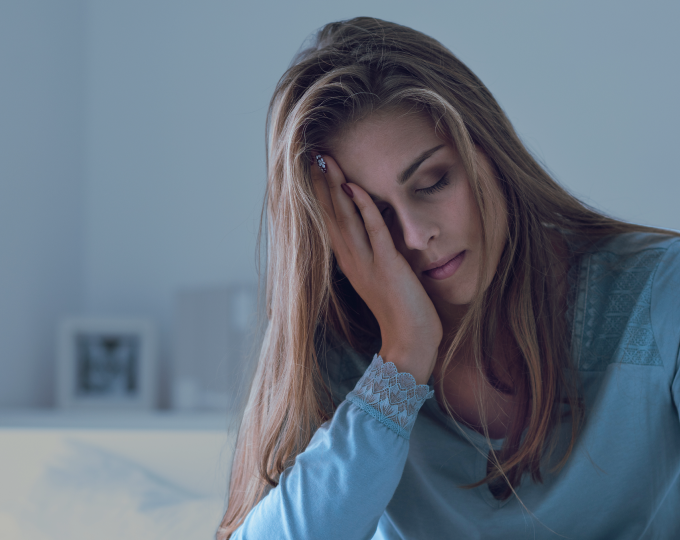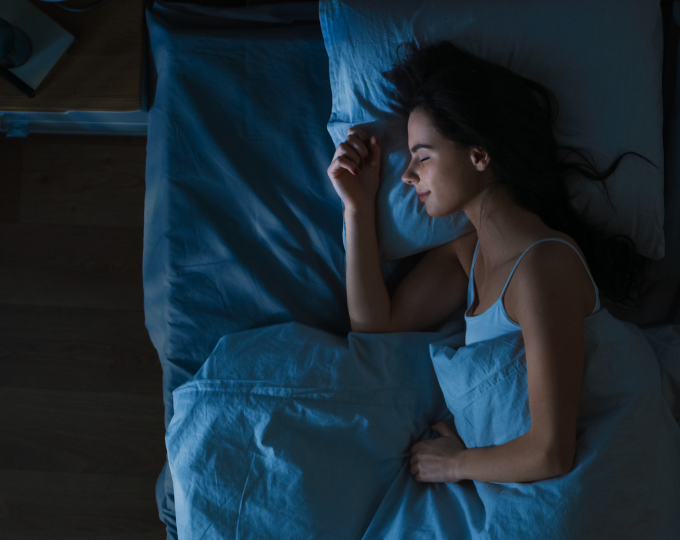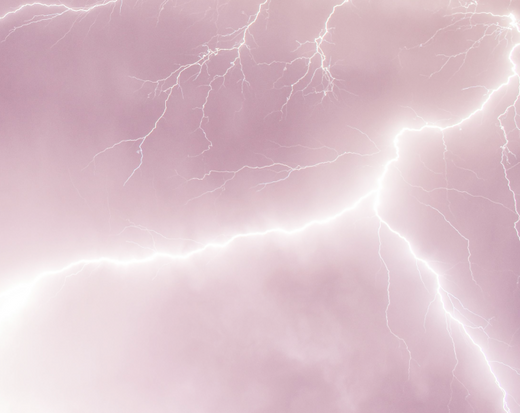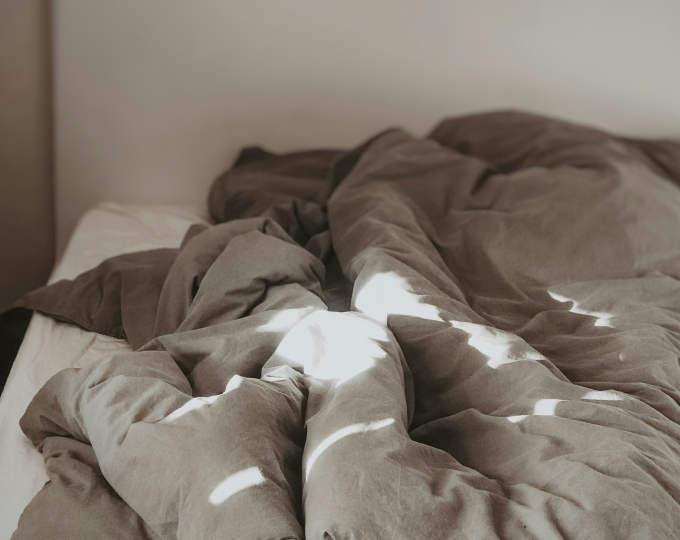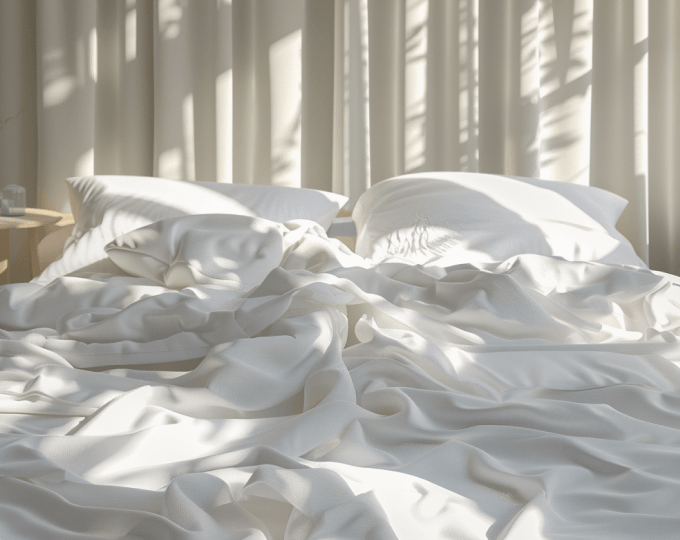Themen dieses Blogartikels:
Table of Contents
- What is melatonin?
- Where is melatonin produced?
- How are melatonin & the day-night rhythm connected?
- How melatonin affects your sleep cycle
- Melatonin as a natural sleeping aid
- Cortisol kick as a stimulant
- How long does it usually take to fall asleep?
- How are melatonin & sleep disorders related?
- What influences melatonin production?
- 7 tips to boost your melatonin production
- Melatonin preparations for the treatment of sleep disorders
- When are supplements alone not the solution?
- FAQ's about melatonin
- Bibliography
What is melatonin?
Melatonin is a hormone that you may know as the sleep and night hormone. Its most important function is to regulate your day-night rhythm. However, the hormone has even more to offer: it is a powerful antioxidant and can help protect the body against oxidative stress1.
Where is melatonin produced?
The body's own hormone comes from the pineal gland (pineal gland) in the diencephalon. This is also where the happiness hormone serotonin is produced, which is the basis for melatonin production. The sleep hormone is produced via several intermediate steps from the precursor tryptophan, an essential amino acid.
A number of cofactors such as B vitamins, magnesium and zinc are also involved in the production of melatonin. If one of these substances is missing, serotonin and melatonin deficiency can be the result.when your body produces melatonin and how much depends on your environment. More precisely, it depends on the light conditions. The pineal gland is connected to the eye's light sensors, which signal when it is time to produce melatonin.
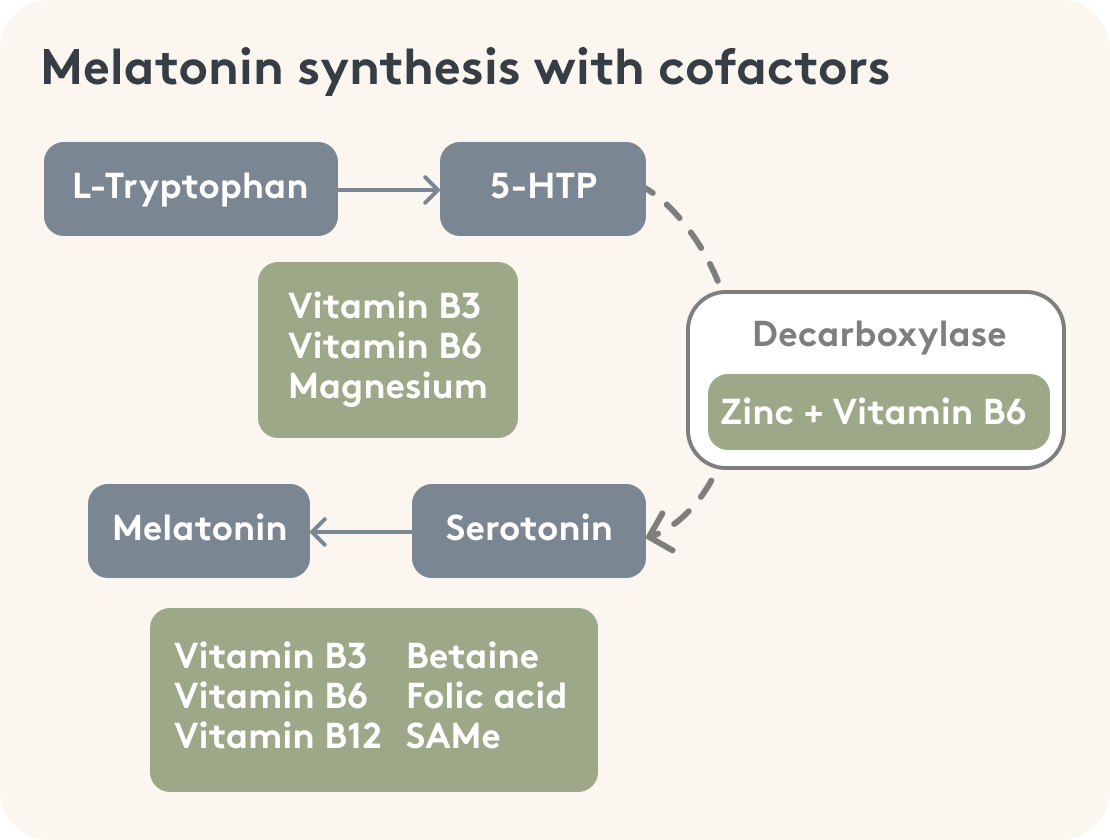

How are melatonin & the day-night rhythm connected?
Melatonin is mainly responsible for regulating your sleep-wake cycle, which is part of the circadian rhythm. The circadian rhythm is your body's internal clock and encompasses all the processes that take place in your body over a 24-hour period. Among other things, it regulates when which hormones are released, which influence the immune system, blood pressure and your mental performance, for example.
How melatonin affects your sleep cycle
When it gets dark in the evening, the pineal gland converts more serotonin into melatonin and releases it into the bloodstream. For your body, this means slowly reducing energy consumption and lowering body temperature and blood pressure.
Melatonin as a natural sleeping aid
The concentration of melatonin in the blood rises until well after midnight. The higher the melatonin level, the more tired you feel. Younger people produce significantly more melatonin than older people.
Melatonin promotes the sleep phase and leads your body more quickly into the deep sleep phase, which is important for your recovery: while you sleep deeply, the glymphatic system runs at full speed. This body's own cleansing program frees your brain cells from metabolic waste products.
Cortisol kick as a stimulant
Towards morning, the pineal gland gradually reduces the release of melatonin, while serotonin levels rise again. At the same time, the adrenal gland releases more cortisol into the blood. This wakefulness and stress hormone is a natural antagonist of melatonin.
The morning cortisol peak ensures a powerful start to the day. The more daylight you get, the more awake you feel and the more energetic you are. The effect is particularly noticeable in summer when the days are long and the sun is shining brightly. As the day progresses, the stress hormone level drops again, the melatonin level rises and the sleep-wake cycle starts all over again.
How long does it usually take to fall asleep?
On average, the time it takes a person to fall asleep is between five and 20 minutes. The phase of falling asleep is followed by the light sleep phase. Overall, your sleep is divided into five sleep stages, in which you sleep at different depths and restfulness, and a distinction is made between REM sleep and non-REM sleep. REM stands for “rapid eye movement”, as rapid eye movements occur under the closed eyelids during this phase. Incidentally, people do not only dream during REM sleep, but in all stages. However, REM dreams often seem more vivid and we remember them better.
It takes around 90 minutes for your body to go through all five stages once. The cycle then starts again. Around 50 minutes are spent in the falling asleep and light sleep phases. Deep sleep and the REM phase account for around 40 minutes, the distribution of which varies depending on the time of day: In the morning you are more likely to be in the REM sleep phase, shortly after falling asleep you are more likely to be in the deep sleep phases.
How often your sleep cycle repeats depends on your individual sleep duration. Ideally, it should be around four to six times a night. In order for your body to recover as well as possible at night, the sleep stages should follow each other undisturbed.
You can find out more about the individual sleep stages in our sleep guide.
How are melatonin & sleep disorders related?
The better your melatonin production works, the easier it is for you to fall asleep. If your melatonin production comes to a standstill, the result is a melatonin deficiency, which manifests itself in various symptoms:
- Difficulty falling asleep or staying asleep
- Daytime tiredness
- Light sleep from which you often wake up
- Dreamless sleep
- Depression
Advertisement
• Wirkung innerhalb von 5 Minuten
• Für das Einschlafen geeignet
• Aufnahme erfolgt über die Mundschleimhaut
• BIG PACK mit 214 Sprühstößen
• Ohne Alkohol / ohne Kaliumsorbat konserviert
• Mit natürlichem Orangengeschmack
• Zu 100% aus natürlichen Rohstoffquellen gewonnen
• Mit Ärzten & Experten entwickelt

What influences melatonin production?
In many people, a disruption to the internal clock inhibits the production of melatonin. Typical triggers are jet lag, night shifts or artificial light. Blue light in particular, which provides sharp, clear images on your smartphone, is suspected of inhibiting the production of melatonin.
Conversely, an excess of melatonin can occur in the fall and winter. Symptoms include fatigue and tiredness. You can regulate the production of the sleep hormone with a daylight lamp and plenty of time outdoors
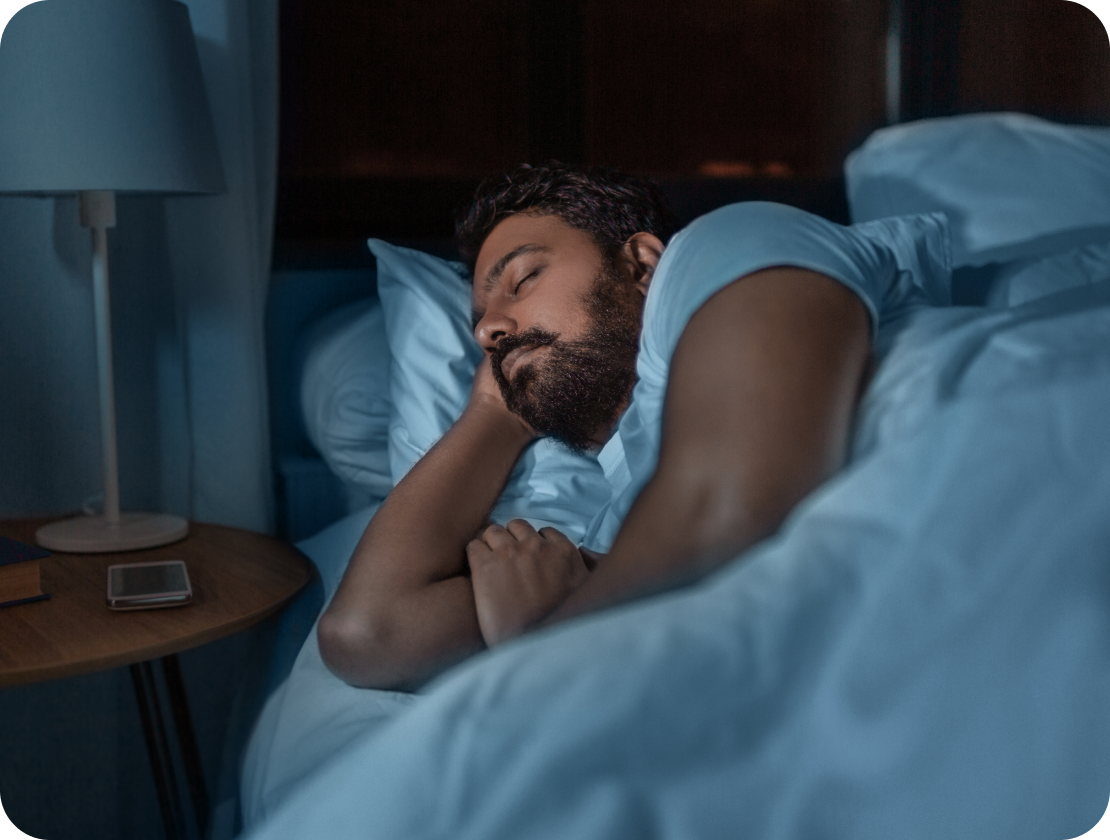
7 tips to boost your melatonin production
Sleep is at least as important for your well-being as a balanced diet and sufficient exercise. Your brain provides you with the key to a restful night's sleep every evening, and you can influence how much melatonin you have available to a certain extent with sleep hygiene. The following tips will boost your melatonin levels:
- Avoid consuming alcohol, caffeine and green or black tea before going to bed - these substances reduce the effect of melatonin
- If possible, ban electronic devices from your bedroom and use warm, dimmed light instead - this makes it easier for your body to rest
- Your internal clock works best with routine - so try to go to bed and get up at the same time every day
- Build an evening ritual into your routine that you maintain before going to bed - this promotes your body's natural sleep-wake cycle
- Ensure optimal sleeping conditions by creating cool temperatures and minimizing noise as much as possible
- Treat yourself to a comfortable night's sleep and adjust your mattress and pillow to your personal needs
- Exercise not only promotes your fitness and well-being, but also a restful night's sleep
Want to do even more for your sleep hygiene? In our blog, you can find out what effect vitamins have on your sleep and get 10 tips for better sleep.
Melatonin preparations for the treatment of sleep disorders
If all the measures for sleep hygiene don't help and you still find it difficult to sleep through the night, taking additional supplements can improve your sleep quality.
Melatonin supplements can help with acute sleep problems caused by jet lag, for example, and in addition to its function as a natural sleep aid, there are other areas of application for melatonin. For example, research is currently being carried out into whether the hormone can support the treatment of Alzheimer's, cancer, ALS or high blood pressure at night.
When are supplements alone not the solution?
Many people find melatonin helpful if they find it difficult to fall asleep from time to time However, in the case of long-term sleep disorders, it is better to get to the bottom of the causes first and then consider taking melatonin products.
It is true that low melatonin levels can trigger sleep disorders. However, other factors such as stress often play a role, against which a melatonin preparation has little effect.
FAQ's about melatonin
The most important questions and answers about taking melatonin to fall asleep
What effect does melatonin have as a sleep aid?
Melatonin can help to shorten your sleep time and alleviate the subjective feeling of jet lag.
How can I measure my melatonin level?
It is possible to have the individual value of melatonin measured in blood, saliva or urine. There are also home test kits that can be used independently to measure melatonin levels. A urine test with the second morning urine is the most reliable, as longer-term levels are visible here.
Are melatonin products addictive?
Melatonin is not a sleeping pill, but a natural sleep aid. The products can be used flexibly, dosed as required and adapted to individual needs.
According to previous research, unlike traditional sleeping pills, melatonin does not cause dependency or habituation effects2. In addition, no “hangover” with dizziness and nausea is to be expected in the morning.
Do melatonin supplements have side effects?
Everyone reacts differently to supplements. This also applies to the sleep hormone melatonin. Side effects of melatonin can include mood swings, headaches, exhaustion and morning tiredness.
Overall, melatonin is considered to have few side effects3. The proof of the pudding is in the eating: If you experience any of the symptoms mentioned, taking melatonin may not be right for you.
Are there any interactions with medications?
To avoid interactions with medication, you should not take a melatonin preparation together with antiepileptic drugs, antidepressants or anticoagulants. It should also not be taken during pregnancy and breastfeeding, as there is still no reliable data on this.
Is melatonin prescription-only?
Melatonin is not available on prescription at a dosage of up to 1 mg per day.
How and when do I take melatonin?
Melatonin can be taken in the form of capsules. The active ingredient is also available in the form of tea or spray. Melatonin works best if the capsules are taken around 30 minutes before going to bed, as the melatonin effect lasts for a relatively short period of up to one hour.
This article is based on carefully researched sources:
Sources & bibliography
- Reiter, RJ, Mayo, JC, Tan, DX, Sainz, RM, Alatorre-Jimenez, M., & Qin, L. (2016). Melatonin as an antioxidant: under promises but over delivers. Journal of pineal research, 61(3), 253-278.
- Lemoine, P., Nir, T., Laudon, M., & Zisapel, N. (2007). Prolonged-release melatonin improves sleep quality and morning alertness in insomnia patients aged 55 years and older and has no withdrawal effects. Journal of sleep research, 16(4), 372-380.
- Xie, Z., Chen, F., Li, W. A., Geng, X., Li, C., Meng, X., Feng, Y., Liu, W., & Yu, F. (2017). A review of sleep disorders and melatonin. Neurological research, 39(6), 559–565.
